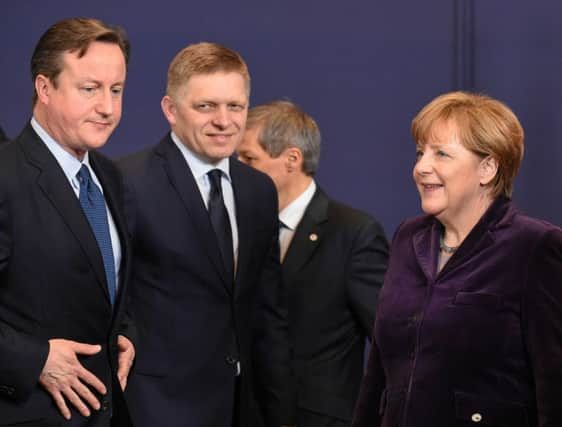David Cameron’s demands ‘unaccepable’, say EU leaders


EC president Donald Tusk did concede that there is a “real chance” of clinching a deal in February if the Prime Minister will compromise.
“The consultations I have led with all member states show goodwill of all the parties involved but it doesn’t change the fact that some parts of the British proposal seem unacceptable,” Mr Tusk said at a dinner yesterday at which EU leaders discussed British demands for reform of the bloc. The UK will have a referendum before the end of 2017 to decide whether to stay in the EU, in line with a Tory manifesto pledge.
Advertisement
Hide AdAdvertisement
Hide AdGerman chancellor Angela Merkel assured Mr Cameron he would have a friend in Germany in his quest to renegotiate fundamental parts of EU legislation if he stayed within the lines of the EU treaty.
“On our side we would like to keep Britain as a member of the EU, but at the same time we do not want to limit the basic freedoms, non-discrimination, the fundamental principles of the EU,” Mrs Merkel said.
“I believe there should be possibilities to find solutions if all sides are willing to compromise,” she said of the upcoming negotiations with Britain.
Poland, Czech Republic, Slovakia and Hungary said in a joint statement they “consider the freedom of movement one of the fundamental values of the European Union” before adding that “we will not support any solutions which would be discriminatory or limit free movement”.
If there is no fundamental reform, Mr Cameron has indicated it could lead to “Brexit,” or a potential British exit. British proposals on welfare and migration are expected to be the toughest to find an agreement on. Particularly grating on member states is a plan for a four-year ban on in-work benefits for migrants, something many feel amounts to discrimination. Mr Cameron has said the issue was not so much people coming to Britain as them getting access to the welfare system too easily.
Speaking ahead of the summit last night Mr Cameron said “we are pushing for real momentum so that we can get this deal done. So I am going to be battling hard for Britain right through the night.”
A February summit is seen as the first opportunity to clinch a reform deal, though a planned March summit would seem more likely.